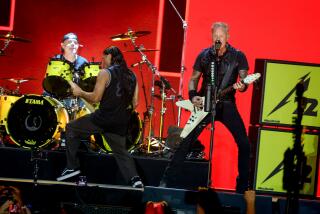DC Talk Delivers a Raw Mixture of Heaven and Earth
- Share via
For years, Christian rock groups seemed the pop alternative of nonalcoholic beer: a mere representation of the real thing.
Missing in most cases were two of rock’s most crucial ingredients: rebellion and tension. Invariably, the songs in Christian rock were limited to polite expressions of heavenly praise. There was little sense of struggle or self-doubt.
The recordings were so tame and unthreatening, in fact, that it was easy to imagine the only people who bought the albums were parents who thrust them on their indifferent youngsters.
No longer.
On Saturday night at the Universal Amphitheatre, DC Talk, the most high-profile of a new wave of best-selling Christian rock groups, exhibited textures so raw and themes so troubled that you can now picture some cautious parents feeling uneasy when their youngsters ask for a copy of an album such as DC Talk’s “Jesus Freak.”
In several songs from that album, the vocal trio acknowledges moments of disillusionment and doubt in ways that remind you of secular grunge or punk outfits. In “Between You and Me,” for instance, the lyrics include these lines: “Sorrow is a lonely feeling / Unsettled is a painful place / I’ve lived with both for far too long.”
The difference between DC Talk (as well as Audio Adrenaline, another Christian rock group that opened the show) and most mainstream bestsellers is that DC Talk’s songs resolve the tension by ending up with messages of inspiration and spiritual hope.
The rebellion, in fact, in these songs--including Audio Adrenaline’s “Never Gonna Be as Big as Jesus,” a slap, perhaps, at John Lennon’s famous line about the Beatles being bigger than Jesus--is against many of the sex ‘n’ drugs attitudes commonly celebrated in secular rock.
While DC Talk--which is backed onstage by six musicians--has a strong point of view, the impact of the songs is frequently dulled by the way the group spells everything out for the listener. The lyrics could move you more if the expressions of salvation were less literal and narrow, along the lines of the more universal and abstract approach of, say, U2’s “The Joshua Tree” album.
Also, it’s hard to tell musically from DC Talk’s show whether the group spends more time reading the Bible or studying other records--both rock and hip-hop.
It’s quite acceptable to play covers--ranging Saturday from such tunes as the Beatles’ “Help!” to R.E.M.’s “It’s the End of the World as We Know It” to a slice of Nirvana’s “All Apologies.”
But DC Talk’s own songs seemed far too derivative of such groups as U2, Nine Inch Nails and the Beastie Boys.
The most powerful moments in the show, ironically, didn’t involve music at all.
They were the two times DC Talk’s Toby McKeehan stepped forward alone and tried to bond with the audience by speaking at length about his own struggles in life. It is a risky maneuver because these monologues could sap the energy from a concert. But they stood out because they seemed so much more personal and unique than most of the music itself. McKeehan wasn’t speaking to the crowd with the slickness of a charismatic preacher, but the vulnerability of a fellow seeker.
If DC Talk--which also includes Michael Tait and Kevin Max Smith--could find ways to effectively inject more of that personal commentary in its music, the group--which has helped infuse Christian rock with the trimmings of real rock--might also give the movement a sense of genuine artistry.
More to Read
The biggest entertainment stories
Get our big stories about Hollywood, film, television, music, arts, culture and more right in your inbox as soon as they publish.
You may occasionally receive promotional content from the Los Angeles Times.










